
The latest Consumer Pulse data from Agile Market Intelligence describes the financial sentiment of Australians in November 2025. Consumer Pulse is an ongoing survey aiming to understand the attitudes, experiences, and priorities of Australian consumers towards their finances. Although some groups have reported less financial anxiety this month, Australians aged 55 years old and above are still affected by this concern due to the inflation of household rates.
Key stats you need to know
- 30% of Australians are anxious about their financial situation in November.
- Australians aged 55 years or older feel that their financial situation has worsened in November compared to last year, with women expressing more financial anxiety by 9% and men by 13%, respectively.
Financial anxiety increases for debt free consumers, mortgage holders, and the older age group
- Debt free consumers and mortgage holders have become more anxious in November, with a 3% and 1% increase, respectively.
- Consumer debt holders remain the most financially anxious demographic group, with 36% of this population expressing such concerns.
Thirty-nine per cent of females aged 55+ years or older are anxious about their financial situation, the largest group in the age and gender demographic. This is followed by men in the same age group, occupying 31% of this segment. By contrast, both genders aged 18-54 years old are less financially anxious by at least 2%. The least worried demographic are men aged between 18-34 years, occupying 12% of their segment. This group, alongside men aged 35-54 years old, have reduced financial anxiety by 5%.
“The numbers show that older Australians are now more concerned about their financial situation compared to the younger cohort,” says Michael Johnson, Director of Agile Market Intelligence. “As housing costs and interest rates increase due to inflation, older consumers worry if they’re financially equipped for the future, including retirement.”
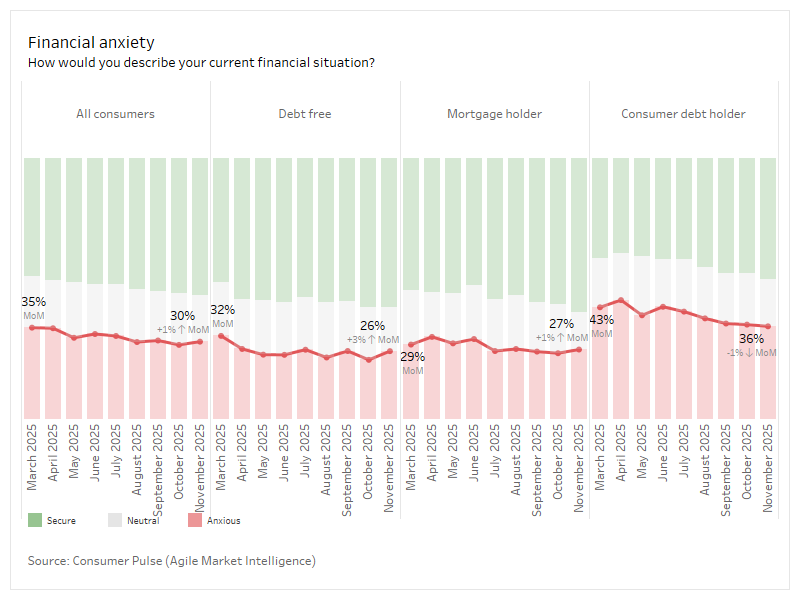

Older Australians feel that their financial situation has declined compared to last year
When asked to compare their situation from the present to 12 months ago, we found that:
- 70% of Australians feel that their financial health has either improved or stayed the same.
- More than 1 in 4 debt holders report that their financial situation has worsened.
- Females aged 18-54 years feel that their financial situation has improved compared by at least 3% from last month.
Forty-six per cent of women aged 55 years and above feel that their situation has worsened, the largest group across the board. This is a sentiment shared by 32% of males in the same age range, an increase of 5% from the previous month.
By contrast, younger Australians feel that their current financial situation is either better or remained the same. Females aged 35-54 have shown a more positive outlook, with less believing their situation has depreciated (-10% from the previous month). Eighteen per cent of males aged 18-34 years old feel that their financial health has worsened, and occupy the smallest group of consumers who express that sentiment.
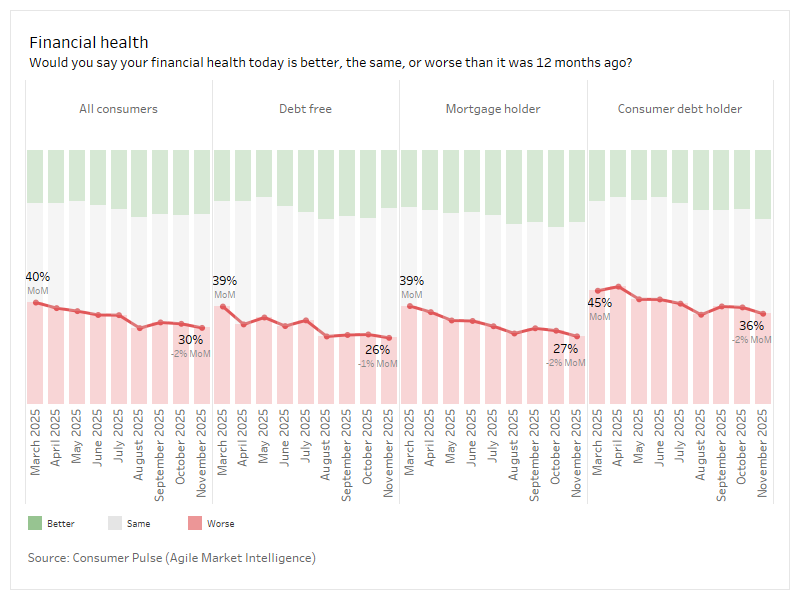
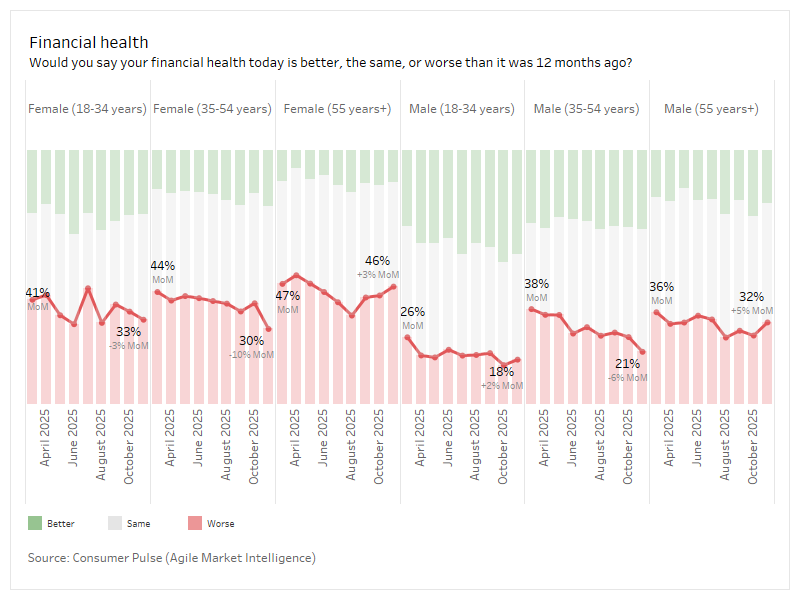
Cash flow has been positively increasing across most age groups, except older females who have reported negative cash flows this month
The Consumer Pulse Cashflow Index is a score that represents the percentage of ‘positive cash flow’ consumers less the percentage of ‘negative cashflow’ consumers. The value lies between -100 and +100, with a positive value indicating that people are saving and investing more than they spend.
- Debt holders feel that their cash flow has improved in November (+2), resulting in an overall positive cash flow of +4.
- Debt free and mortgage holders feel that their cash flow has remained the same from last October at values of +23 and +18, respectively.
- Men have reported more positive cash flows compared to women.
Among females, those aged 55 years and above feel less positive cash flow, having dropped to a score of -4 (-9) compared to the previous month. Across the board, this is the only group that reportedly spends more than they save or invest. By contrast, females aged 35-54 have declared a cash flow reaching a +15, a steep increase of +24 values.
All men’s cash flows have dropped compared this November, but still remain in the positive values. Males aged 18-34 dropped by had a score of +22, having dropped -15 values compared to last month. The other age groups reported scores of +22 (males 35-54) and +26 (males 55+ years), showing that despite some difficulties, males are perceived to save and invest more than they spend.
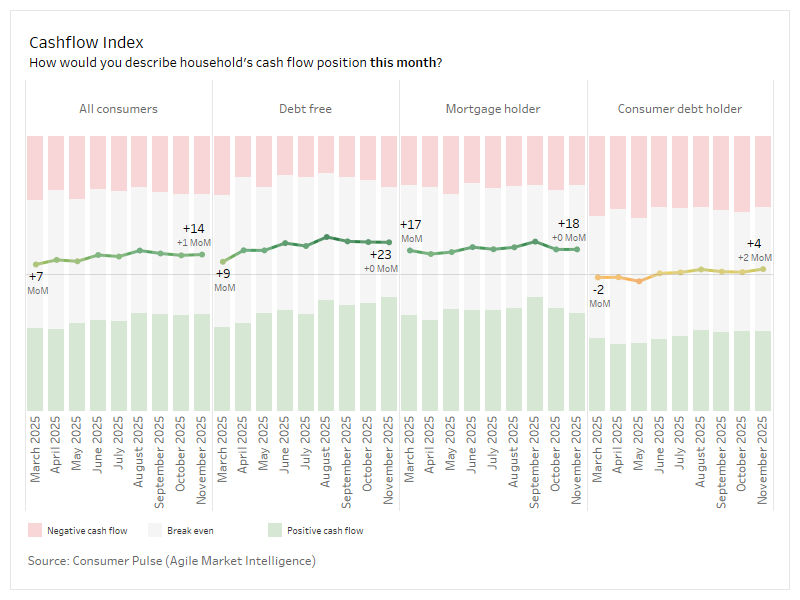
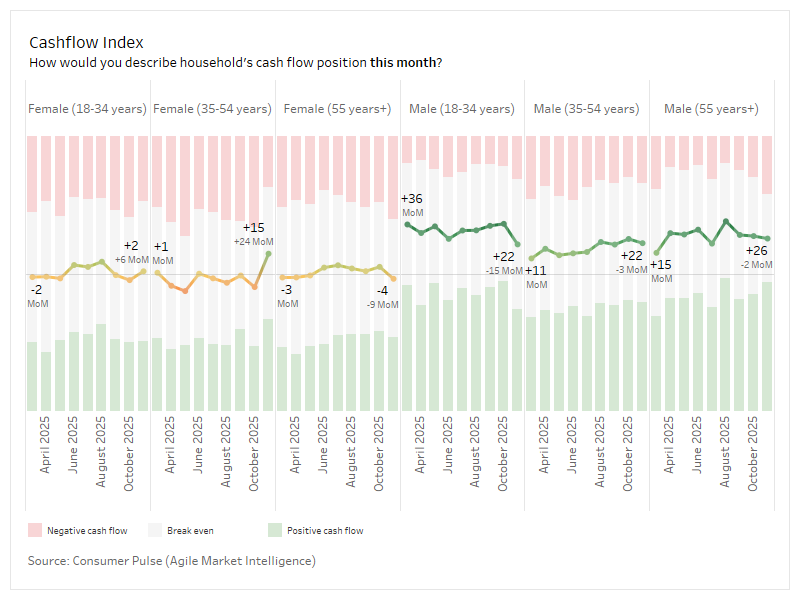
About the research
The Consumer Pulse is an always-on tracker developed by Agile Market Intelligence to monitor consumer sentiment, financial stress, and behavioural shifts across key household segments. The survey provides a real-time view of financial wellbeing in Australia, segmented by debt status, home ownership, and other demographics. This program tracks about 1,500 consumers monthly on their sentiment based on their financial security/anxiety, their perceived financial health relative to a year ago and their reported household cashflow for the current month. For this article, November 2025 data is from 332 responses collected between 1st and 7th of November 2025.


